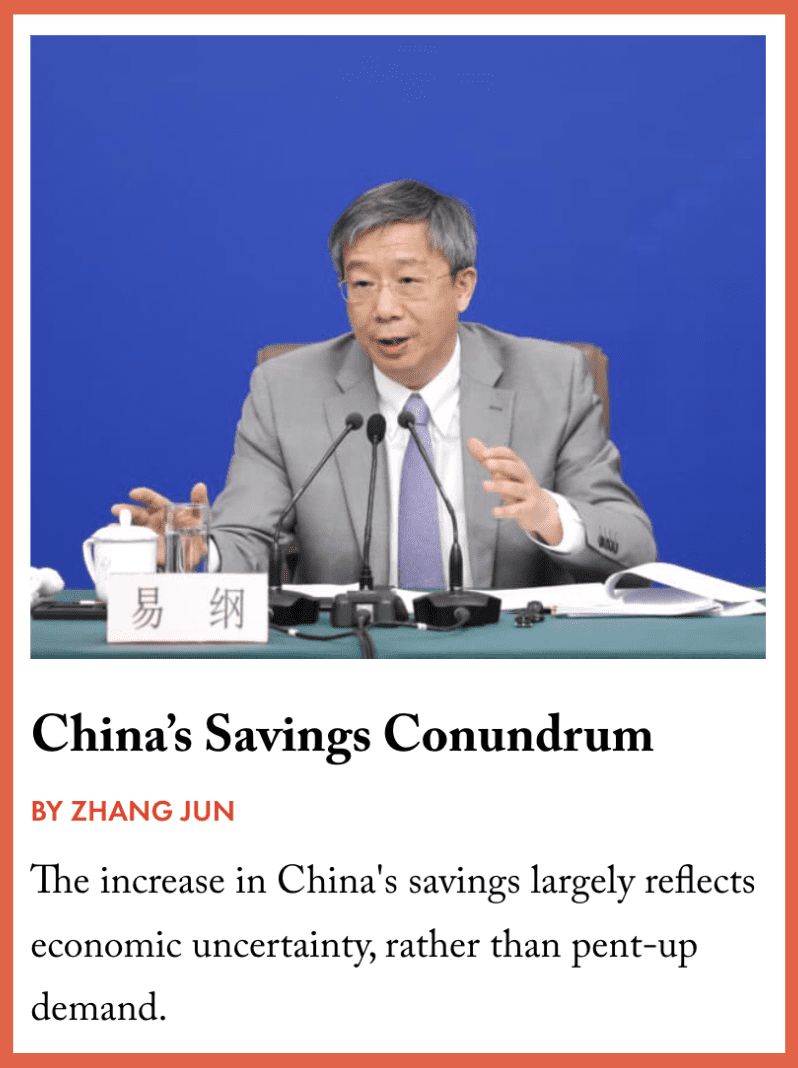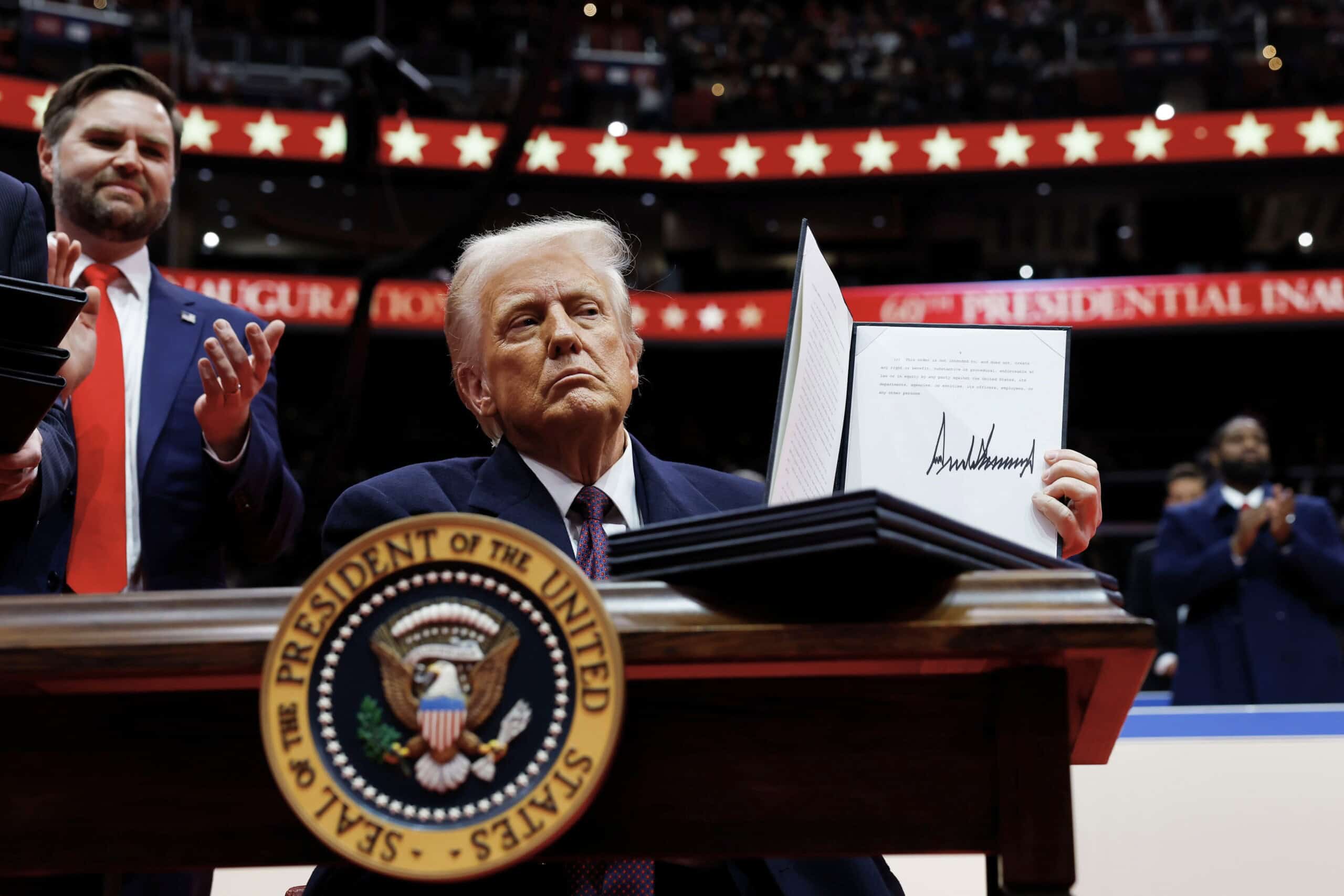Tao Wang is an economist who worked at the International Monetary Fund after gaining a doctorate at New York University. She later joined the investment bank UBS where she is currently a managing director and chief China economist. In a recent interview she talked about her new book Making Sense of China’s Economy, and the issues facing the world’s second-largest economic power. The following is a lightly edited transcript of that conversation — the views expressed are Tao’s own and not those of UBS.

Illustration by Lauren Crow
Q: Your book is a terrific overview of China’s economy and how it works. What were the main misunderstandings about China’s economy that you were trying to address?
A: I wasn’t necessarily trying to address any two or three specific misunderstandings, but I do feel many of the narratives and discussions about China’s economy can get quite simplistic or too one dimensional. For example, people sometimes attribute China’s economic success to a demographic dividend, or say that China’s economy has been export driven and that joining the WTO was the reason behind China’s success. They all, of course, are part of China’s success story, but they are not the only reason, or even the most important reason. And also, when looking at the Chinese government, some outside observers perceive that policies change at the whim of specific leaders. But one needs to understand that these policies are often responding to issues emerging in the economy or in society.
People also tend to see China as one big, homogeneous entity and don’t see that there are very big differences across regions and across sectors; while China’s government is typically seen as very powerful, dictating policy from top down, people don’t appreciate that policymaking and implementation in China can actually be really complicated: Local governments are very important and can be quite powerful, while different ministries have different and sometimes competing interests. So with this book I am trying to bring out the complexity and a lot of the background to help readers better understand the complex story that is China’s economy.
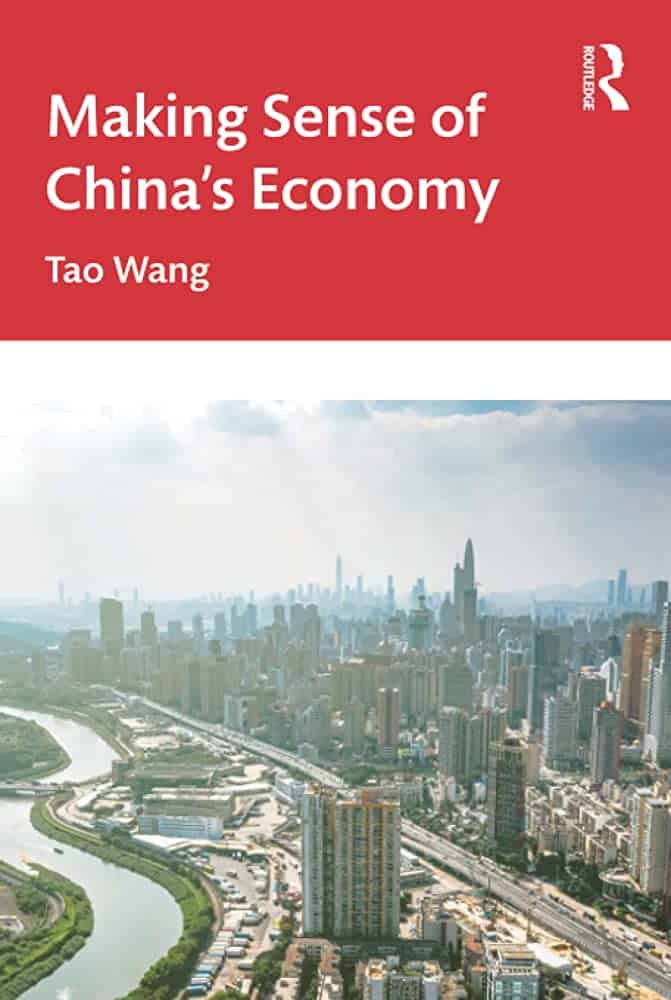
Former Premier Wen Jiabao famously described China’s economic growth as unstable, unbalanced, uncoordinated, and unsustainable back in 2007. To what extent do you think that description still applies in terms of the problems China’s economy faces?
I think even the current leaders would still say there are a lot of structural problems and that growth is unbalanced and uncoordinated and unsustainable: but those words may be used to describe a slightly different set of issues.
When Wen spoke those words, just before the global financial crisis, China was growing very fast. But the growth was incredibly investment-driven, and very energy and pollution intensive. That was seen as unsustainable. Growth was also seen as being driven by low value-added exports, low-end manufacturing and heavy industry production, and very much reliant on debt. And of course income inequality was also rising at the time.
Over the years, the authorities have actually started to address these issues. The environmental situation has definitely improved since around 2013. Income inequality has also started to come down because the government has begun to build a wider social safety net, with better pension and health care insurance coverage, and more funding for rural schools, things like that. And China has also moved up the value chain in the manufacturing sector, while some of the production relying on cheap labor has moved out to other countries.
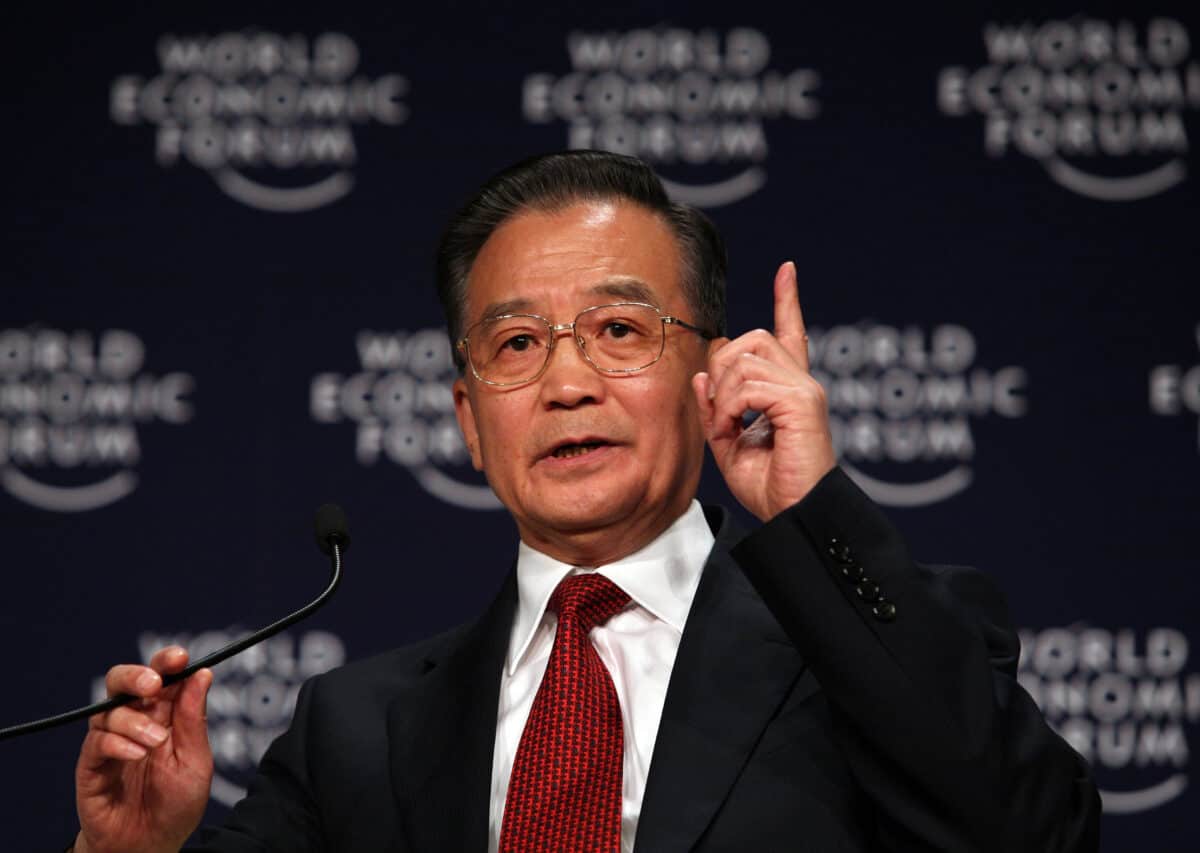
But these issues have certainly not been fully addressed. Environmental challenges are still quite high: energy efficiency has greatly improved, but total energy consumption and emissions are much higher now than back then. Income inequality is still high, even though it has come down somewhat. Exports are no longer as important as back then: the shift towards more domestic demand has happened, but there hasn’t been much progress on the shift towards consumption.
The big issue is that when the authorities see some of these long-term challenges they start to address them, but then some near-term objectives that seem more urgent come up. For example, after Premier Wen Jiabao talked about rebalancing China’s economy, the global financial crisis happened. And so China pushed out a huge debt- and investment- driven stimulus, pushing some of its imbalances to a new level. China started deleveraging and rebalancing the economy again in the middle of the last decade; but then we had COVID, we had the trade disputes, which stalled or detracted some of the efforts. Whenever they start to do rebalancing and deleveraging, China’s government worries about growth going down too much; and then they reverse some of the policies. So there’s always a dilemma and trade off there.
| BIO AT A GLANCE | |
|---|---|
| BIRTHPLACE | Changsha, Hunan, China |
| CURRENT POSITION | Chief China Economist at UBS |
One of the criticisms in recent years, particularly since Xi Jinping took over, is that there’s been a retrenchment towards greater reliance on the state and state-owned enterprises, and more government intervention in the economy. To what extent do you share that analysis? Is there a danger that China’s leaders have lost their pragmatism and have become more ideologically driven?
China’s government has focused more on three areas in recent years. One is the embrace of state ownership, one is increased regulation, and the third is more emphasis on common prosperity. All these could make it seem like they have become more ideological and just want more state control. But if we put things in the context of what’s been happening in China, they’re in part still responding to the issues in society.
On common prosperity, for example, as I mentioned, inequality is quite high. And there’s a lot of imbalance, especially between the rural and urban population, and especially for rural migrants living in cities. Income inequality became worse after the global financial crisis, not just in China, but also in the West. China’s policy makers were also seeing how increased inequality and divisions in society have affected Western societies and politics. And they became alarmed that this would also become a big issue in China and they tried to address that. Perhaps it is valid to ask whether the response has been well-executed.
What the global financial crisis brought home was that the market does not always work, and that even the most powerful market economy can have big problems; and then its government has to step in, just like the Chinese government.
On the regulation front, the increased regulation of recent years may have been a bit shocking, especially the way it was rolled out in a concentrated period of time and implemented quickly. But on the other hand, some of the sectors had been overlooked by regulators, there was a bit of a Wild West going on, with risks and problems accumulating. I’m not just talking about the internet companies; shadow banking had been let loose and had run wild, leading to big problems emerging in the middle part of the last decade, which then led to tighter rules and the deleveraging effort. Overall, many of the responses have been to regulate previously largely unregulated or under-supervised markets. I don’t think that’s necessarily driven by ideology, but to control risks and address some problems.
| MISCELLANEA | |
|---|---|
| BOOK REC | For people who want to understand China’s development, I would always recommend Peter Hessler’s Country Driving, even to many Chinese. |
| FAVORITE MUSIC | Jazz |
| FAVORITE FILMS | Duck Soup, and Star Wars |
On the increased emphasis on the state sector, my conjecture is that after the global financial crisis, policy makers took a different look at Western market economies. In the 1990s, the reforms were about making China more of a market economy, modeled after the U.S. as the most advanced market economy. But what the global financial crisis brought home was that the market does not always work, and that even the most powerful market economy can have big problems; and then its government has to step in, just like the Chinese government. So there were questions and debates around that time about the merit of moving further in the direction of a purely market driven economy; and more people started to become proud of what China was able to do during the crisis.
So the China model, or ‘Beijing consensus’, started to become popular, although that’s probably an ill-defined phrase. Since then the party and the government leadership embraced the fact that China has a different model, and that state ownership will always be a big part of the economy, and that this has advantages at times. The goal is not to diminish the SOEs or privatize them, but to strengthen them and make them more profitable. To some extent, that’s also pragmatic because the state sector employs a lot of people, they are politically very powerful. The question of how to make them more efficient and less wasteful became the goal of reform, rather than continuing to let the private sector have a bigger share. Part of this is ideological, but it’s also a recognition that the Western market economy has problems and that China’s model has some merit.
Would it be fair to say that policy makers feel it’s worthwhile to have more state intervention, even if that has some effect on the overall growth rate?
I don’t know that policymakers think that this model has an overall negative impact on growth or on the economy. They see the cost and benefit. The benefit is probably greater stability, and less volatility in the macro economy and in society. They think that over the longer term, stability is important for sustainable growth.
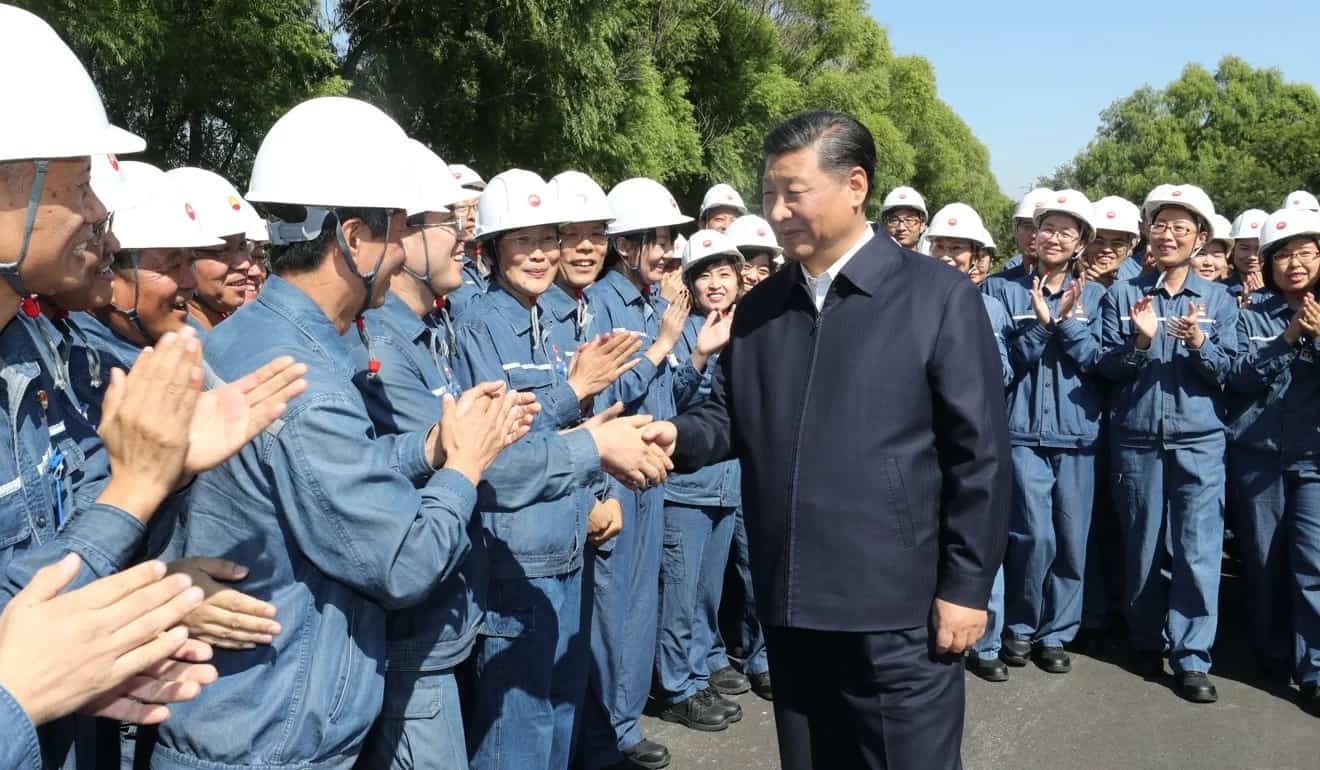
In the last 10-15 years, I would say that state ownership has not really increased, but it certainly stopped declining. Between the 1990s and early 2000s, there was a big decline in state ownership, especially in the manufacturing sector. But in the last 15 years, we’ve seen ups and downs, but in general, it’s been very stable. There’s a little bit of a cyclicality there: in certain times, you see that the market or the private sector seems to be gaining, and then at other times, the private sector retreats. During economic downturns, like the global financial crisis, the government drives big stimulus efforts that are enacted by local governments or SOEs, and the share of the state sector in the economy rises. When the economy grows strongly, the private sector usually gains market share.
We constantly hear the refrain that the country needs to move away from its reliance on debt-funded investment, and that the economy needs to rely more on domestic household consumption. Does China’s economy still need to rebalance in this way? And why has progress been so slow?
The simple answer is yes, definitely the economy still needs rebalancing. Total consumption as a share of GDP is still less than 55 percent, and household consumption is under 40 percent, which is very low.
Why has progress of rebalancing been slow? One big reason for the consumption share being low is that household income as a share of the economy has been low. The rest goes to the corporate sector, including SOEs, and the government. Labor income growth has been relatively weak, compared to the overall economy. There was some improvement between 2011 and 2016 or so, but it has stalled.
Making the change means changing the pro-investment growth model, especially the inclination of local governments. One issue is that local governments get most of their tax revenue from the corporate sector, so they favor corporations. Previously, they would give subsidies to any company, not just SOEs but also foreign companies, through providing, say, free land in an industrial park, or some energy subsidies, and so on. That has been gradually reduced. But capital is still relatively cheap. That means that China’s investment-driven growth model has been relatively slow to change. Also, the state owned sector previously did not pay dividends, and even now, they pay dividends, but not to the state budget. So there is little redistribution of SOE income to the household sector, directly or indirectly.
The second thing is that the household saving rate is also very high. Because the social safety net is under-developed and uneven, people don’t feel very confident about their future, about their old age, about health care costs, and so on. So they save a lot. The government needs to address that issue by providing better and more equal public services, a better social safety net, pensions, health care insurance, and also more equal and better education opportunities for people. That includes reforming the hukou system too.
Of course, income inequality is also an issue. We know that rich people have a lower propensity to consume, they don’t need to consume a big portion of their income, and poor people tend to consume more of their income. So income inequality also constrains overall consumption.
In terms of rebalancing towards consumption, the answer lies in changing the growth model, reducing various subsidies to investment, and asking SOEs to pay dividends to the household sector through the central government budget (so that the government can spend more on providing public services and social safety net). The latter could also reduce the so-called precautionary saving of the population. “Common prosperity” comes into play too. When we talk about common prosperity, the authorities’ focus is going to be about raising labor income and on employment-driven growth rather than investment-driven growth.
All of these involve very difficult structural reforms. It will take a long time to achieve a rebalancing of China’s economy and for consumption to become more important, it’s not something that China can immediately achieve.
It is striking how low income tax is in China, and how low it is as a proportion of the government’s budget, in a country that nominally has a Communist Party in charge and aims for socialism. Is there going to need to be major tax reform in China?
Yes, I definitely think there is a need for major tax reform, though I don’t think it will come soon and any changes will only be very gradual. China’s personal income tax as a share of the budget is usually 7-8 percent of tax revenue, and it’s about 1.5 percent of GDP, much lower than, say, a country like the U.S. The majority of China’s tax income comes from the corporate sector, whether it’s VAT tax or corporate profit tax.
The problem is that resistance is very high: after more than a decade of discussion, we still don’t really see a nationwide property tax, for example.
When China started to design its tax system in the reform era, one thing they believed was that people are very poor, so we’re not going to tax the people. Also, it’s much easier to collect tax from corporations. This tax system worked very well in the industrialization era but the issue with this kind of tax structure is that it’s not very sustainable; corporate related tax is highly cyclical, while personal income tax is more stable, especially for local governments. The second thing is that the current income tax system is quite unfair. It’s still mainly a salary tax. China doesn’t have a capital gains tax, while property-related income taxes are at a very, very low rate. So rich people who don’t make their money through salaries are taxed very little. Overall, less than 10 percent of the population pay income tax, so tax coverage is actually very low.
Given that China has a rapidly aging population, local governments are going to see their bills for health care and pensions increase, so the spending pressure on them is going to rise. A more stable tax structure will really be necessary. However, the simple fact is nobody wants to pay more tax, so it’s going to be incredibly difficult to push through personal income tax reform. The government will be very, very cautious and any tax reform will be very gradual. The problem is that resistance is very high: after more than a decade of discussion, we still don’t really see a nationwide property tax, for example.
Can you talk about why reforms to allow greater mobility are so important to the economy?
In China, as I mentioned, there’s a huge income gap, but also an opportunity gap between rural and urban residents. One reason, of course, is that urban and rural labor have different productivity levels. But another big part is down to the household registration, or hukou system, which assigns a person to where they are born, and is very hard to change. People with a rural hukou do not have the same access to education or job opportunities, or the same entitlements: it really sets them back. And for the roughly 200 million people who have moved from rural areas and live and work in cities, and still have a rural hukou, they still don’t have the same access to such opportunities. So you have this institutionally entrenched inequality. Also, urban land and rural land are treated differently, so farmers cannot sell their land directly to the market, meaning they cannot reap the benefit of land appreciation.
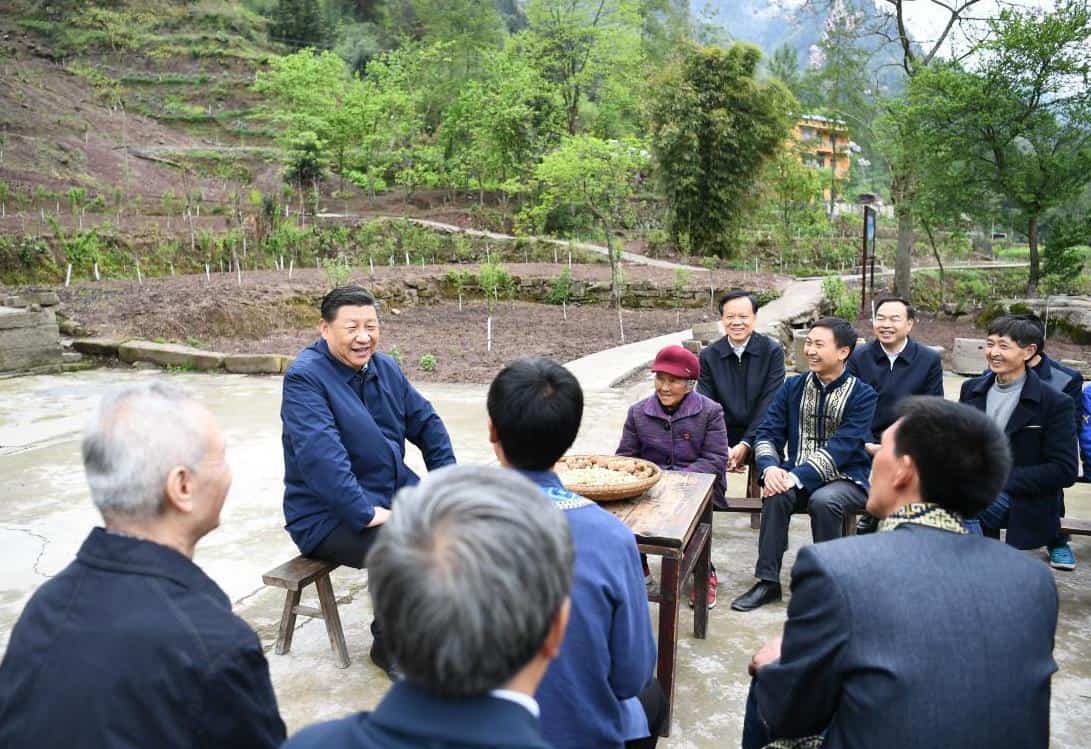
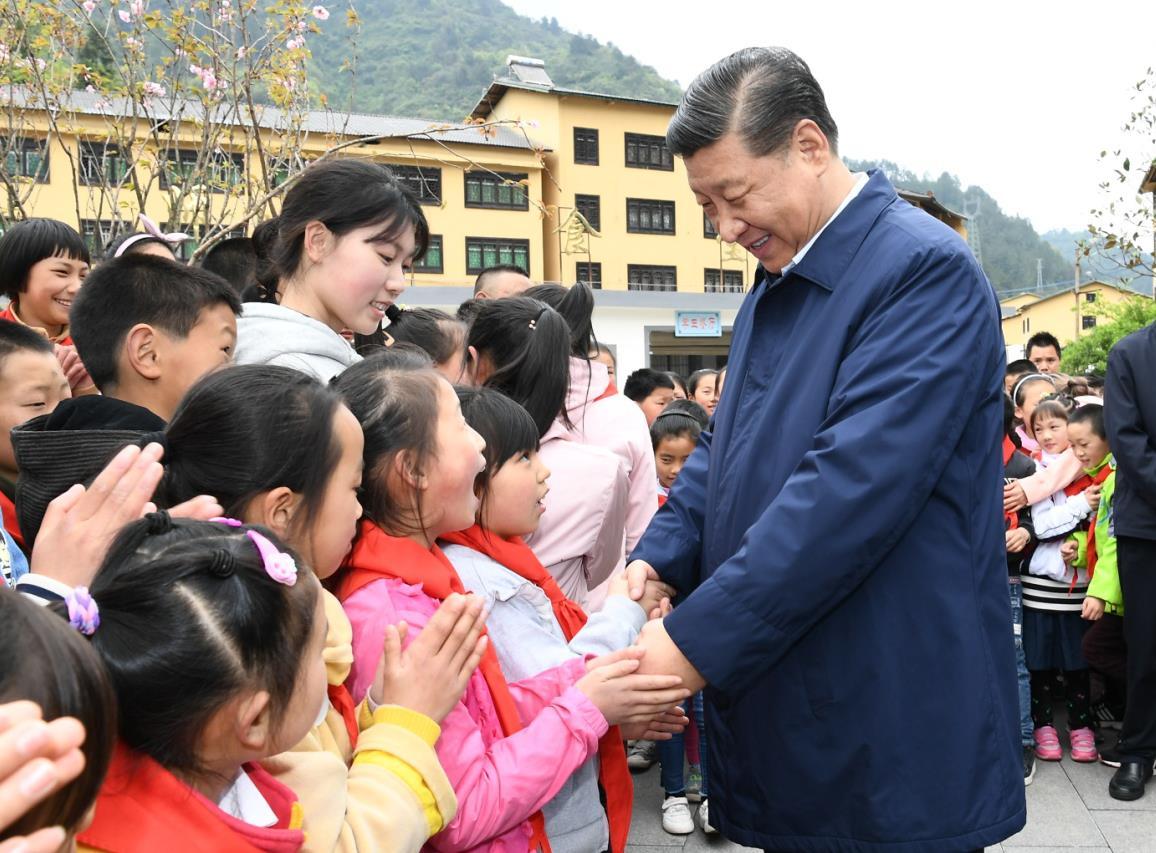
Xi Jinping visiting village representatives and schoolchildren in Shizhu County, rural Chongqing, April 15, 2019. Credit: CCTV
One big problem is that these 200 million or so people don’t have the same confidence to consume as other urban residents — one of the reasons why consumption is low, as we mentioned. There are also huge social implications. Because of this unequal access, the migrants often leave their children behind in the countryside, and families are not together for years and years. Rural children are being educated in schools that are not as good as urban ones. So that potentially has a big negative impact on human capital, and on the next generation of the labor force in China. This issue has been very well documented and analyzed by Scott Rozelle.
These kinds of issues need to be resolved for growth to be more sustainable, for consumption to grow, and also for some of the social issues to be addressed to achieve social stability, which is what the government wants. But hukou reform is tremendously challenging. For one thing, local governments don’t have the incentive to provide the same kind of benefits to migrant workers or rural residents, because they don’t collect income tax from them. Also, local governments would say they don’t have the resources. So the central government has been calling for hukou reform, but local governments have been moving slowly, because they don’t have the incentive or resources, or a combination of both. There is certainly a need to change government incentives and allocate more resources for hukou reform. In addition, even some small reforms, such as allowing migrant children to study in urban areas and take the college entrance exam in cities, have been met with strong resistance from urban residents, as it increases competition for their children to get into better schools. Given that local government finances are already challenged, the quality of the public services or pension payouts may be affected as well if they had to provide for migrants equally.
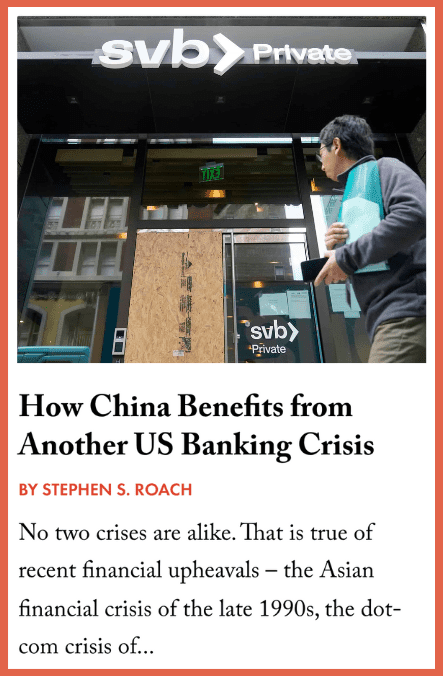
China’s debt levels, depending on which statistics you look at, are around 300 percent of GDP, eye-wateringly high on paper. Why haven’t we seen a financial crisis in China yet?
There are a few factors. One is that China’s debt is high, but it’s mostly domestic, and it’s financed by very high savings. Not only is China’s household savings high, but also national savings in China have been something like 45-50 percent of GDP. That’s very high. This means debt is financed domestically, so that China is not subject to the whim of international investors, when they worry about China’s debt level and so on.
And the second thing is that the high debt is largely in the form of bank loans, and even if it’s in the form of bonds, half of those are held by state-owned banks. The funding structure of banks is quite stable, and the banks are largely state owned. So there’s very little risk of people not trusting the banks and wanting to take their money out. Of course, there’s also capital controls, it’s not easy to take the money out of the country, and there’s not a lot of investment channels, other than property. So people tend to keep their savings as bank deposits.
A debt crisis, whether it’s in emerging markets or in the U.S. during the global financial crisis, tends to be a liquidity crisis, when people lose confidence in the banks or banks don’t have the confidence in the economy and start to withdraw and withhold credit.
In China, as I just mentioned, bank funding is stable. Also, because banks are state owned, the government has a strong power to persuade banks to continue to lend, even when the economy is going down, even when some of the companies obviously don’t have the ability to pay money back. So in China credit growth tends to go up when the economy’s going down, rather than the other way around. This then sustains that high debt level.
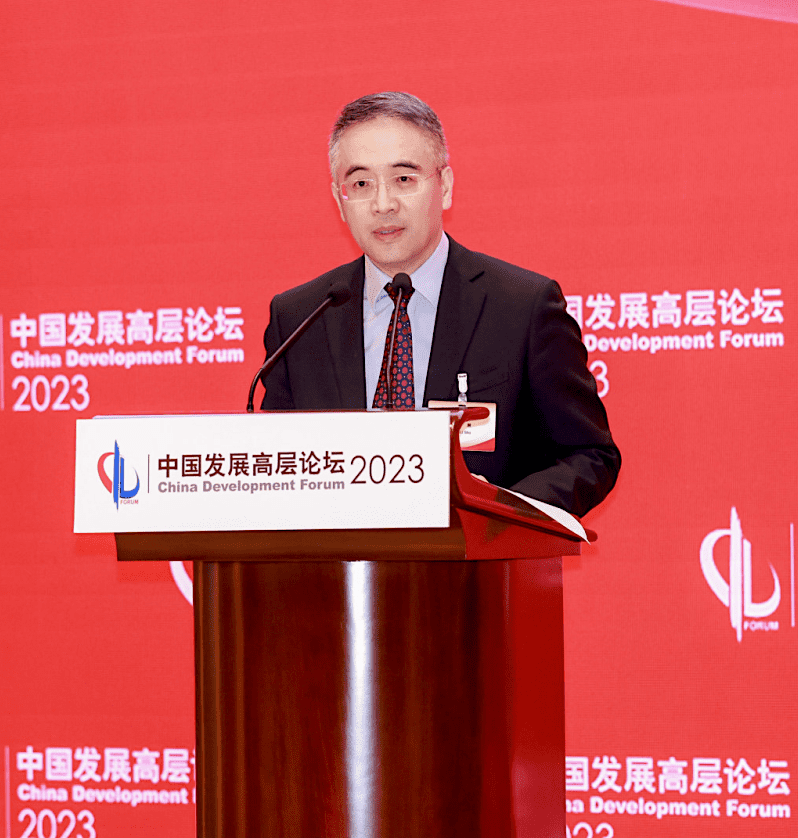
Another feature in China is that with the banks being owned by the state, and a lot of the debtors being state owned enterprises, or local government vehicles, even private sector companies, they are influenced by the government. So the government can actually organize debt restructuring in a coordinated manner, rather than through the market. Western-style market clearing is probably more efficient, but it also can be brutal, it can lead to liquidity crises and market dislocations. So in China’s case, resolving debt issues is more of a slow burn. You don’t have debt crises, but you definitely still have that debt burden that the economy and the banks carry, and the inefficiency related to that.
Where do you see Chinese growth ending up in the short to medium term? Can the country achieve the sort of productivity gains that are needed to drive growth, in the absence of a rising population and ever greater debt-driven investment?
China’s population is aging: the total population has started to decline while the working age population has been declining for a decade. But one thing, at least in this decade, is that we still have an unfinished transfer of labor from the rural sector going on. Also, China’s retirement age is very young, the actual retirement age on average is about 54. So if we extend the retirement age by three years by the end of this decade, that could add around 40 million people to the labor force, which could offset the decline of the working age population. So the declining population is not an immediate, hard constraint on growth.
… restricted access to advanced technologies will likely hurt China’s overall productivity growth and, hence, its long-term potential growth.
In terms of labor productivity, one key source for gain will be continued investment in more advanced technology and equipment, because China’s level of automation is still relatively low. So there is a lot of relatively low hanging fruit still to be had, without innovating at the cutting edge of technology, by just applying mature technologies more broadly in the economy. Of course, restricted access to advanced technologies will likely hurt China’s overall productivity growth and, hence, its long-term potential growth.
By putting this together, we estimate that this decade, average potential growth can still be around 4-4.5 percent. That does mean, though, that by 2030, growth would be probably around 3.5 percent. Potential growth is really sloping downwards.
What’s the experience covering the Chinese economy all these years been like? Could you have ever imagined that this is how you would have spent your career when you were growing up in China?
I certainly did not expect that when I was growing up. I am, personally, a product of the reform and opening; I got a chance to study abroad and got a chance to work for foreign companies and talk to investors and witness the remarkable transformations. One thing in the last 15 years of working for UBS and in the industry is how some of the questions from investors never change. Many of the issues still remain, there’s some progress, there are some setbacks: We talk about the aging population, hukou reform, SOE reform, the property bubble, all of these issues. There’s obviously been some progress in the last 15 years but some of these issues just stay the same. Still, there’s never a dull moment — there are always new developments.

Andrew Peaple is a UK-based editor at The Wire. Previously, Andrew was a reporter and editor at The Wall Street Journal, including stints in Beijing from 2007 to 2010 and in Hong Kong from 2015 to 2019. Among other roles, Andrew was Asia editor for the Heard on the Street column, and the Asia markets editor. @andypeaps

